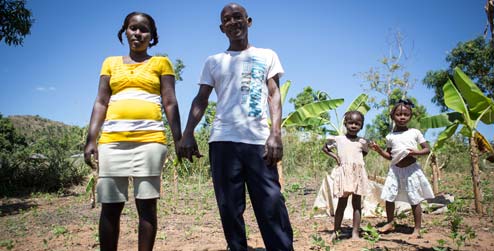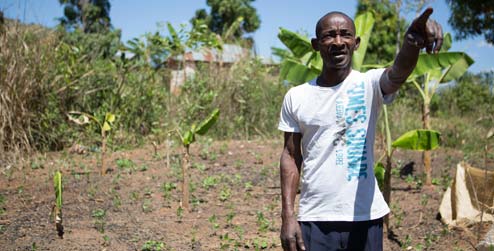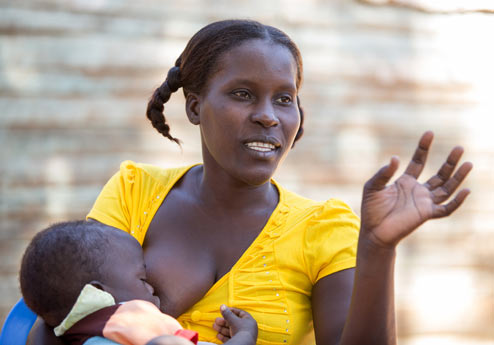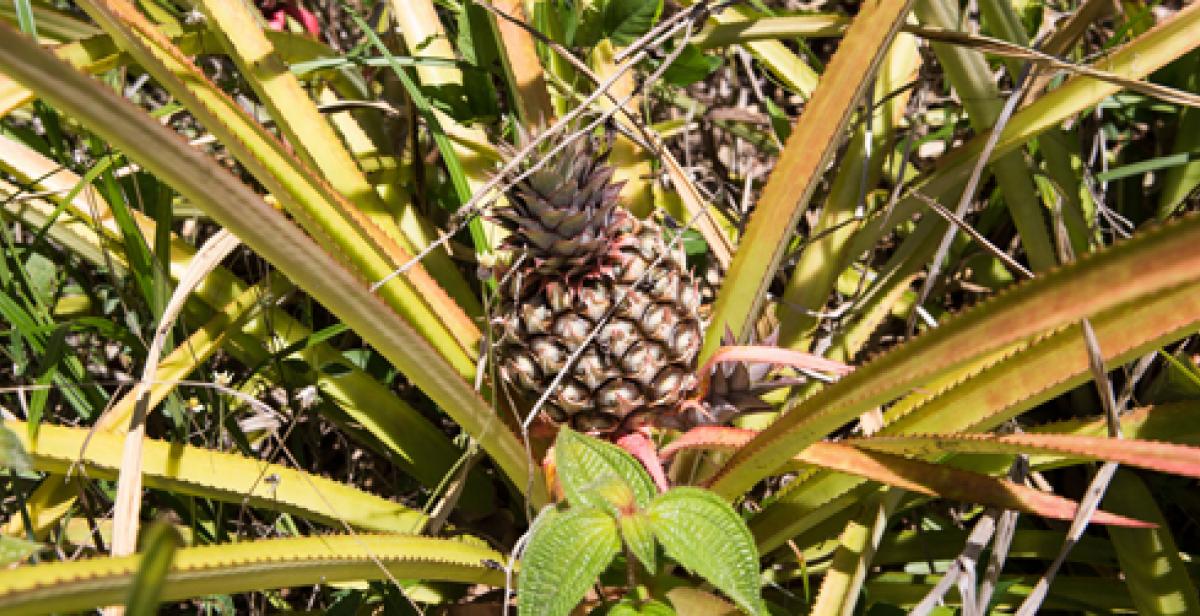As delegates gather in Stockholm for World Water Week, Progressio is asking 'What about water for food?'
It’s easy to forget what efforts and resources go into producing food. So, what if the only food destined for your plate this autumn was growing on a small plot of land outside your house?
Mimose, 45, and her husband Elismar, 51, live in Lamine, Haiti. They grow sweet potatoes, yukkas, beans, plantains, pineapples and cabbages. They have a bumper crop of veggies growing in their garden and seem pretty self-sufficient.
But, it’s not always a ‘good life’, as Elismar explains: “It normally rains in May, June and November, but we have noticed that the rains don’t come when we expect them to anymore and it doesn’t rain for as long as it used to. This means we don’t have as much water to grow enough crops to feed our family.”
Small-scale farmers produce a third of the world's food. Ironically however, the majority of the world’s hungry people are themselves food producers. And here in Haiti, as elsewhere, accessing water is a daily challenge.

“We are not able to collect a lot of rainwater because we don’t have the means to store it,” Elismar explains. “Generally, we use rain water for agriculture and the river, but the river is a long way and a difficult walk. There’s not a lot of water downstream and so we have to go to the source and that’s an hour away.”
In Haiti, the distance you live from a water source can decide whether your crops, and therefore your family, thrive or merely survive.
Mimose is concerned: “The river water is also contaminated, so has to be filtered before we can drink it and I worry that it will make my family sick; that’s why we walk further to the source of the river. People wash everything in the river, from their clothes to their bikes. Dead animals get washed along the river too, so the water downstream, where we are, gets very dirty.”
Safe drinking water is essential. However members of the farmers’ association in nearby Gens de Nantes believe: “Water for agriculture has to be our priority, because if we can grow crops then we can sell the surplus and buy bottled water to drink, but without water for agriculture, we have no food, water or income.”
Mimose and Elismar are working with local organisation Solidaridad Fwontalye and Progressio development worker Gabriel Petit-Homme to improve and adapt their farming techniques. They all agree that the missing ingredient for successfully growing crops, from pineapples to potatoes, is water.

“Around 250 households rely on the same source of water. The community further up the hill has a cistern, but we don’t have access to the water it collects, because we don’t have the funds to construct a system of pipes,” explains Elismar.
The community is good at sharing water, but there is competition when the water source is running low. After all, who wouldn’t stick out their elbows to ensure their family survived a dry spell?
“We are concerned that things will only get worse without leadership and intervention,” says Mimose. “Water is life and without it we can’t do anything.”

Repeatedly, farmers in Haiti tell us “dlo se lavi”. It’s Creole for “water is life”. Their words echo with the voices of small-scale farmers everywhere.
While larger scale agricultural industry can be extremely water intensive, small-scale farming tends to be rain fed. It’s more ecological, but also more vulnerable to climate change and unpredictable rainfall, particularly if farmers are not equipped with adequate water storage and irrigation infrastructure.
Solidaridad Fwontayle provides much-needed practical support. They promote agro-ecological approaches and encourage farmers, especially women, to form Water User Associations to make joint decisions about water capture, storage and conservation.
70% of farmers in developing countries are women, so it makes sense to pay them special attention. According to the United Nations Food and Agriculture Organisation, investing to bolster the access, knowledge and resources of women farmers could reduce the number of hungry people worldwide by up to 150 million people. Women’s participation in water management is essential.
It’s simple: without water, crops cannot grow. In order to produce enough food to support themselves, small-scale farmers need better access to water resources and irrigation systems. Investing in these types of solutions would support agriculture-based livelihoods, like Mimose and Elismar’s, and boost food security worldwide.
That’s why Progressio has been calling on the Department for International Development to ‘fall in love with farmers’. This week (World Water Week 1-6 September) we are presenting a petition and a photo exhibition explaining the situation of small-scale farmers to Parliamentary Under-Secretary of State Lynne Featherstone.
It is vital that sustainable and equitable access to water for small-scale farmers, particularly women, remains a priority for UK government spending on international development. A vision for the eradication of hunger and poverty cannot be realised unless crops are watered.
An extended version of this article, written by Esther Trewinnard and Lis Wallace, was published in the 31 August 2013 edition of The Tablet - it is also available online to Tablet subscribers.
Photos © Fran Afonso/Progressio
Read more about our 'Food for a better future' food security project supporting small-scale farmers in Haiti.



